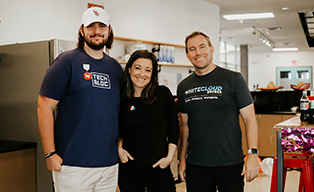There are fundamental differences between startup companies and small businesses. Discovering the right business path often happens at the start of an entrepreneur’s journey, so understanding these distinctions will help you identify where you and your business idea best fit.
There are six ways small businesses and startups are different.
- Growth goals
- Risks
- Innovation
- Funding
- Team
- Lifestyle
Growth goals
Startups approach business development goals with disruptive growth in mind. Using Uber as an example, this peer-to-peer ridesharing, food delivery, and transportation network company headquartered in San Francisco doesn’t serve the local market exclusively. People globally now use Uber to book a ride. Thus, startups develop their products and company structure for massive growth, often changing customer behavior in the process.
The U.S. Small Business Administration (SBA) describes small businesses as “independently owned and operated, organized for profit, and not dominant in its field.” Small businesses focus on sustaining their business, selling a known product or service over the long term. But, we’re not talking about adopting a brand-new product or service. Customers may see a new computer repair shop or cleaners in their neighborhood and shop at that business, given its convenient location or better prices.
A major difference between the two business models starts with goals for growth. Startups strive to disrupt the market with a compelling, new business offering. In contrast, the small business aims to sustain their company over the long term by securing their footing in an established market.
Risk Factors
Startups seek to disrupt their chosen market significantly, often dominating the market completely. Introducing a new idea also means creating an entirely new niche for a product or service. Because there is no pre-existing proven model to adapt and use, startups must work hard to make the idea appealing to consumers. This introduces much more risk to the startup business model than a standard small business. Startups often are not profitable at first, or even for the first few years.
Small businesses have different kinds of risks. They’re launching into an already established niche and are not looking to revolutionize the business model, market, or product. These independently owned and operated companies are trying to maintain a stable income. There is much less risk of failure with small businesses, making them more sustainable in the long run. Oftentimes, small businesses are passed down through families, generating income for generations.
Here’s where the goals for growth drive different outcomes for these two different business entities. A startup wants to expand quickly to “scale” or become a much bigger company, while a small business focuses on creating and maintaining a stable revenue stream.
How these risks translate over a company’s lifecycle is reflected in the average failure rate for these two business models.
- According to the Bureau of Labor Statistics, as reported by Fundera, approximately 20 percent of small businesses fail within the first year.
- Contrast that to startups, which the Bureau of Labor Statistics reports have an 80 percent failure rate in the first year.
Innovation
Product or service innovation is among the most important differences between startups and small businesses.
A small business is one of many businesses in an established market. A cookie shop may offer different cookies than another cookie business, but the customer knows what to expect.
Startups create something new or improve drastically upon what already exists. For instance, one may develop a new class of goods (wearable internet-connected device), a new business model (Airbnb), or a new technology (3D printing).
Funding
The amounts and types of investing in startups and small businesses are vastly different.
Opening a small business requires cash, often in the form of private savings, investments from family and friends, and financing from a bank or small business lender. Small business owners must track their debt if they are to repay loans and remain solvent.
Some startups launch with the help of friends and family, while others consider crowdfunding, pitch competitions, and other equity-free funding sources. Founders often work hard to garner funding from angel investors, venture capitalists, and other investment groups. Managing all funding sources via a capitalization table plus investors clamoring for a return on their funding create additional pressures on the startup.
Your team
In a small business, many workers are hired for specific roles as needed. Roles and functions are typically distributed across the company. Pay rates for specific jobs allow employees to negotiate their advancement as they progress and gain experience.
In a startup, the company may be a single-member entity for a while until co-founders or other foundational startup members join the company. The earliest employees may work without pay, receiving an equity share instead. However, only some startups are going to offer equity to employees, offer equity to advisors, or take on investors.
Plus, if there isn’t enough revenue, paying salaries becomes incredibly difficult, not to mention the struggle to cover all roles. A digital marketer may need to take on tasks better suited for graphic artists, marketing managers, and content writers – even if they have no expertise or training in those areas. The saying about startups frantically “building an airplane while falling from the sky,” aptly describes the mad scramble to get everything done fast.
Lifestyle
Because small businesses are less risky than startups, most founders can combine work and personal life. Yes, a businessperson is typically on-call whenever there is an issue to be resolved at the business. Over time, a smoothly running business can be balanced against one’s personal responsibilities.
Startup life can be much more frantic (see #5 and “falling from the sky”). Because founders are creating a new product or service, even a new business model or industry altogether, almost everything must be developed from scratch. Add to startup life the lack of revenue and uncertainty that the company will survive its first year, and you have pressures and demands on your time, energy, and resources that far surpass the life of a well-run small business.
To sum up
At Geekdom, we help founders — people who decide to launch a company. Founders take an idea and use their skills and knowledge to build a business from nothing.
Looking for resources to build your business, connections to grow your network, or inspiration to spark your next great idea? We’ve got you covered.
Check out our monthly Startup Day at Geekdom. Our monthly Startup Day is for anyone interested in getting more involved in San Antonio’s entrepreneurial startup scene. Enjoy a full day of free coworking community at Geekdom as you explore growing opportunities in downtown San Antonio.
The featured image is of two founders talking at a co-working desk. Photo courtesy Geekdom.










